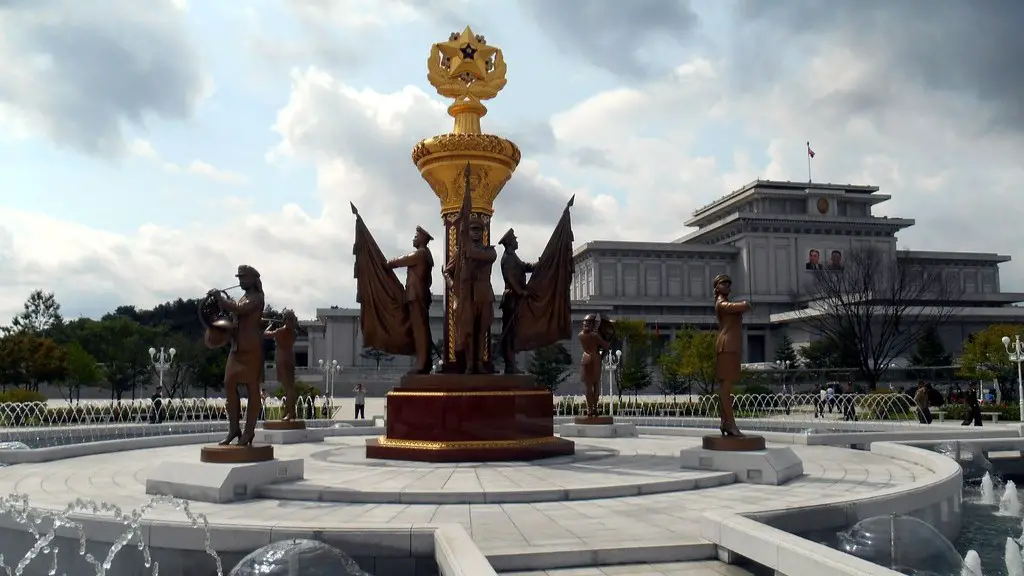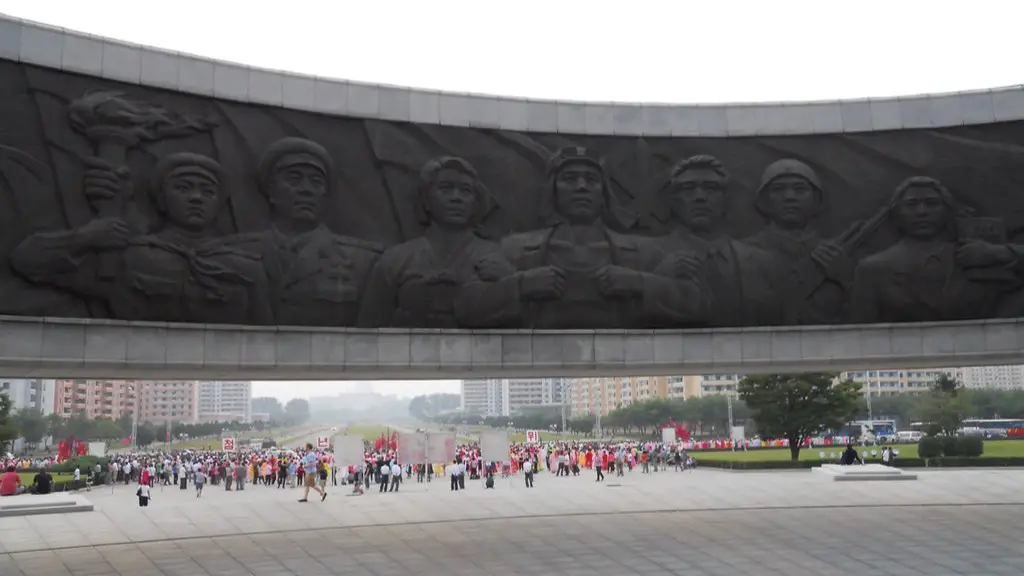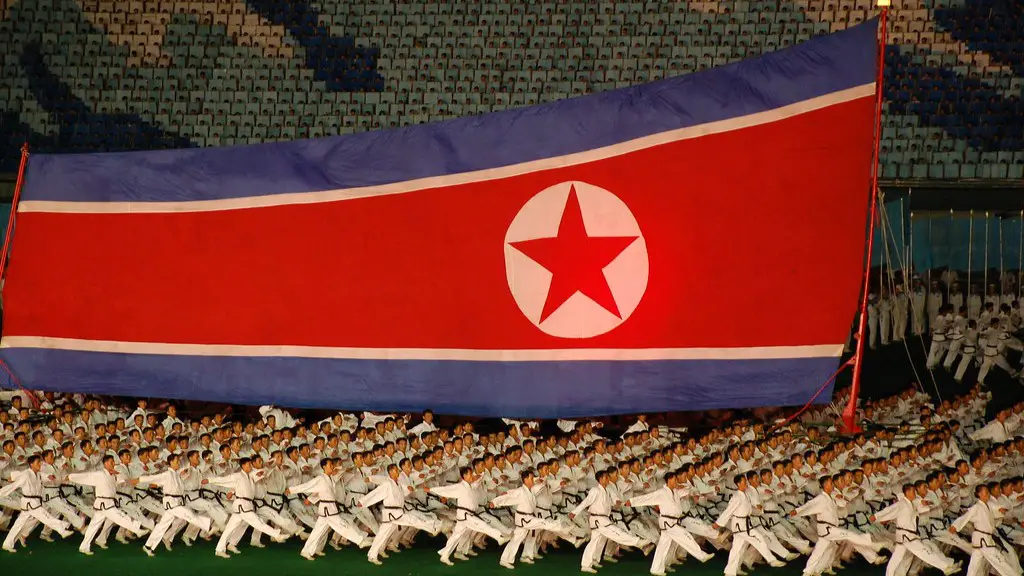Background
North Korea, officially the Democratic People’s Republic of Korea, is an unrecognized nuclear state in East Asia, located in the northern part of the Korean Peninsula. North Korea has been under a series of international sanctions since 2006 after its first nuclear test. These sanctions have been gradually tightened in response to the country’s continued development of nuclear weapons and ballistic missile tests. The country has also been isolated from the global trading system due to its severe human rights abuses and lack of political reform. The purpose of the sanctions is to persuade North Korea to return to the negotiating table and to give up its nuclear ambitions.
Impact of sanctions
While the impact of the sanctions is difficult to assess due to limited access to the country, it is clear that they have had a significant impact on North Korea’s economy. According to the World Bank, North Korea’s GDP per capita was $1,880 in 2017, an 8 percent decrease from the previous year. This is the second lowest GDP per capita among all countries in East Asia and the Pacific region, and is one of the lowest in the world. The sanctions have also hampered North Korea’s access to international trade and capital, limiting its ability to fund its nuclear ambitions.
Sanctions By Other Nations
The United States and its allies have imposed additional sanctions on North Korea in response to its continued development of nuclear weapons and ballistic missile tests. In 2017, the United Nations Security Council adopted Resolution 2321, which included a ban on North Korean exports of coal, iron, lead and seafood, as well as a ban on new joint ventures with North Korean entities. The United States also imposed significant financial sanctions on North Korea in 2018, banning US banks from doing business with North Korean banks and freezing the assets of certain individuals and entities linked to North Korean activities.
Effectiveness of Sanctions
The effectiveness of the sanctions is difficult to assess due to the limited access and information available on North Korea. However, some analysts believe that the sanctions have had a limited effect on North Korea’s economy and have done little to persuade the country to abandon its nuclear ambitions. They argue that the sanctions have only further isolated North Korea and aggravated the situation by limiting its access to international trade and capital.
Impact on Human Rights
The sanctions have had a devastating effect on the people of North Korea. According to the United Nations, an estimated 10.3 million people in North Korea are facing food insecurity and malnutrition as a result of the sanctions. This has had a devastating effect on the health of the population, as well as on the country’s education system and infrastructure. Furthermore, due to the isolation of the country, its people have little access to information and are unable to speak out against the government’s human rights abuses.
US-North Korea Relations
The United States has led the international efforts to put pressure on North Korea to give up its nuclear ambitions and return to the negotiating table. US Presidents George W. Bush and Barack Obama both pursued a policy of “strategic patience” towards North Korea. This policy aimed to hold the country accountable for its nuclear activities and human rights abuses by refusing to engage in direct dialogue with the regime. President Donald Trump, however, has taken a different approach, engaging in direct diplomacy with North Korean leader Kim Jong Un. This has resulted in a thaw in US-North Korea relations and the two leaders have met several times in the past year.
Stalemate
Despite this progress, the United States and North Korea remain at an impasse. North Korea has refused to abandon its nuclear weapons program and has continued to test ballistic missiles. The United States, meanwhile, has refused to ease sanctions until North Korea takes significant steps towards denuclearization. As a result, the international community remains in a stalemate, as neither side is willing to budge.
International Cooperation
In order to resolve this stalemate and move towards a resolution, there must be greater international cooperation. First, the United States must take a comprehensive approach to North Korea and engage in direct dialogue with the regime. Sanctions alone are not enough to persuade the country to abandon its nuclear ambitions, and must be coupled with other measures, such as economic incentives and diplomatic engagement. Second, the international community must provide support to the people of North Korea, who are bearing the brunt of the sanctions. This could include humanitarian aid, economic aid, and technical assistance to develop the country’s infrastructure. Finally, China and Russia must join the rest of the world in pressuring North Korea to denuclearize by enforcing the sanctions regime and engaging in direct diplomatic efforts.
Future of Sanctions
The future of the sanctions regime on North Korea is unclear. While the sanctions have had a significant impact on North Korea’s economy, they have done little to persuade the regime to abandon its nuclear ambitions. It is therefore unlikely that the sanctions will remain in place indefinitely. In order for the sanctions to be lifted, North Korea must take concrete steps towards denuclearization and make significant progress towards political and economic reform. In the meantime, the international community must continue to pressure North Korea to abandon its nuclear program and to improve its human rights record.
Pressure on International Companies
A significant challenge for the sanctions regime is the difficulty of enforcing them on multinational corporations. Many of these companies are reluctant to comply with sanctions due to concerns over economic losses or reputational damage. This problem is compounded by the fact that many companies are based in countries that do not have strict enforcement mechanisms in place. As a result, it is difficult to ensure that companies are abiding by the sanctions. To address this challenge, the international community must continue to strengthen its enforcement mechanisms and ensure that companies are held accountable for their actions.
North Korean Response
The North Korean response to the sanctions has been mixed. While the regime has imposed some of its own sanctions on international corporations, it has also taken steps to minimize the impact of the sanctions on its people. For example, the government has relaxed restrictions on foreign travel and the import of consumer goods. Additionally, the regime has sought to increase its access to international markets and foreign capital by seeking deals with countries including China, Russia and South Korea. While these measures reduce the impact of the sanctions on North Korea, they also indicate that the regime is not willing to abandon its nuclear ambitions.
Increased Cooperation and Diplomacy
Ultimately, the only way to resolve the crisis with North Korea is through increased cooperation and diplomacy. The international community must continue to pressure the regime to abandon its nuclear ambitions and improve its human rights record. At the same time, it must also provide support to the people of North Korea and ensure that the sanctions regime does not adversely affect the population. Finally, direct dialogue between the United States and North Korea is essential in order to reach a resolution and build a lasting peace on the Korean peninsula.



